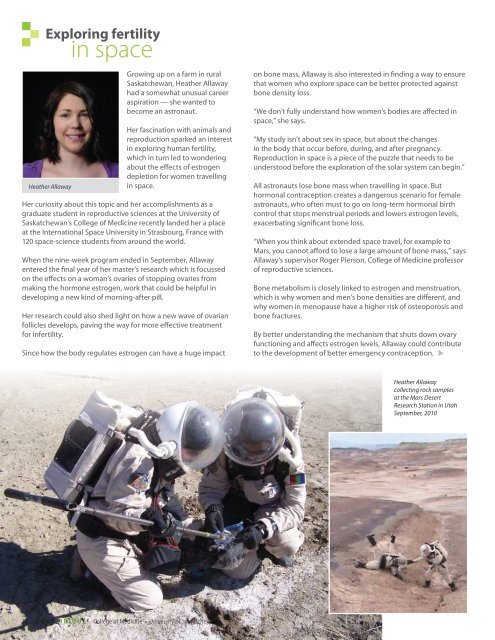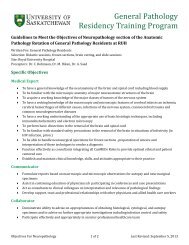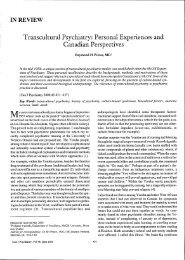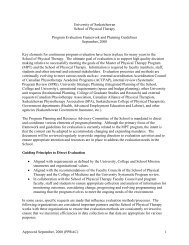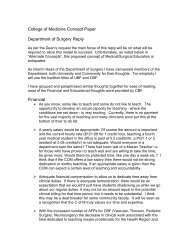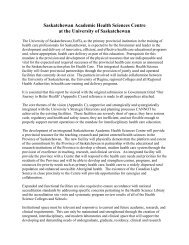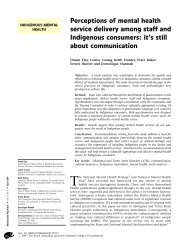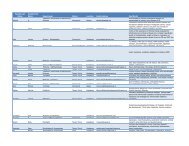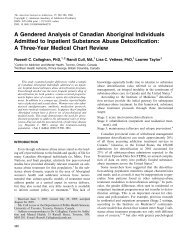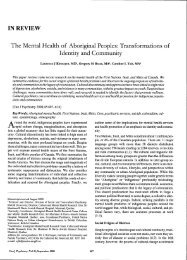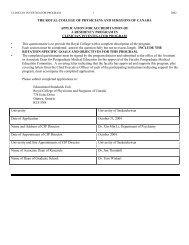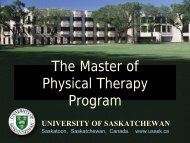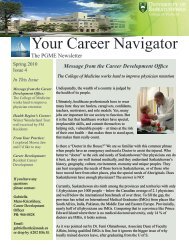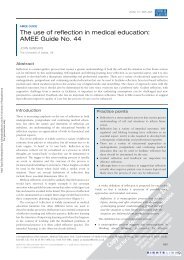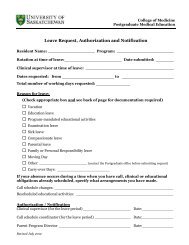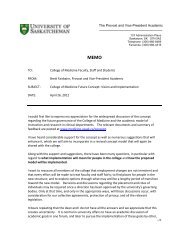COMMUNIQUé - College of Medicine - University of Saskatchewan
COMMUNIQUé - College of Medicine - University of Saskatchewan
COMMUNIQUé - College of Medicine - University of Saskatchewan
You also want an ePaper? Increase the reach of your titles
YUMPU automatically turns print PDFs into web optimized ePapers that Google loves.
Exploring fertility<br />
in space<br />
Heather Allaway<br />
Growing up on a farm in rural<br />
<strong>Saskatchewan</strong>, Heather Allaway<br />
had a somewhat unusual career<br />
aspiration — she wanted to<br />
become an astronaut.<br />
Her fascination with animals and<br />
reproduction sparked an interest<br />
in exploring human fertility,<br />
which in turn led to wondering<br />
about the effects <strong>of</strong> estrogen<br />
depletion for women travelling<br />
in space.<br />
Her curiosity about this topic and her accomplishments as a<br />
graduate student in reproductive sciences at the <strong>University</strong> <strong>of</strong><br />
<strong>Saskatchewan</strong>’s <strong>College</strong> <strong>of</strong> <strong>Medicine</strong> recently landed her a place<br />
at the International Space <strong>University</strong> in Strasbourg, France with<br />
120 space-science students from around the world.<br />
When the nine-week program ended in September, Allaway<br />
entered the final year <strong>of</strong> her master’s research which is focussed<br />
on the effects on a woman’s ovaries <strong>of</strong> stopping ovaries from<br />
making the hormone estrogen, work that could be helpful in<br />
developing a new kind <strong>of</strong> morning-after pill.<br />
Her research could also shed light on how a new wave <strong>of</strong> ovarian<br />
follicles develops, paving the way for more effective treatment<br />
for infertility.<br />
Since how the body regulates estrogen can have a huge impact<br />
on bone mass, Allaway is also interested in finding a way to ensure<br />
that women who explore space can be better protected against<br />
bone density loss.<br />
“We don’t fully understand how women’s bodies are affected in<br />
space,” she says.<br />
“My study isn’t about sex in space, but about the changes<br />
in the body that occur before, during, and after pregnancy.<br />
Reproduction in space is a piece <strong>of</strong> the puzzle that needs to be<br />
understood before the exploration <strong>of</strong> the solar system can begin.”<br />
All astronauts lose bone mass when travelling in space. But<br />
hormonal contraception creates a dangerous scenario for female<br />
astronauts, who <strong>of</strong>ten must to go on long-term hormonal birth<br />
control that stops menstrual periods and lowers estrogen levels,<br />
exacerbating significant bone loss.<br />
“When you think about extended space travel, for example to<br />
Mars, you cannot afford to lose a large amount <strong>of</strong> bone mass,” says<br />
Allaway’s supervisor Roger Pierson, <strong>College</strong> <strong>of</strong> <strong>Medicine</strong> pr<strong>of</strong>essor<br />
<strong>of</strong> reproductive sciences.<br />
Bone metabolism is closely linked to estrogen and menstruation,<br />
which is why women and men’s bone densities are different, and<br />
why women in menopause have a higher risk <strong>of</strong> osteoporosis and<br />
bone fractures.<br />
By better understanding the mechanism that shuts down ovary<br />
functioning and affects estrogen levels, Allaway could contribute<br />
to the development <strong>of</strong> better emergency contraception.<br />
s<br />
Heather Allaway<br />
collecting rock samples<br />
at the Mars Desert<br />
Research Station in Utah<br />
September, 2010<br />
10 C O M M U N I Q U É <strong>College</strong> <strong>of</strong> <strong>Medicine</strong> • <strong>University</strong> <strong>of</strong> <strong>Saskatchewan</strong>


